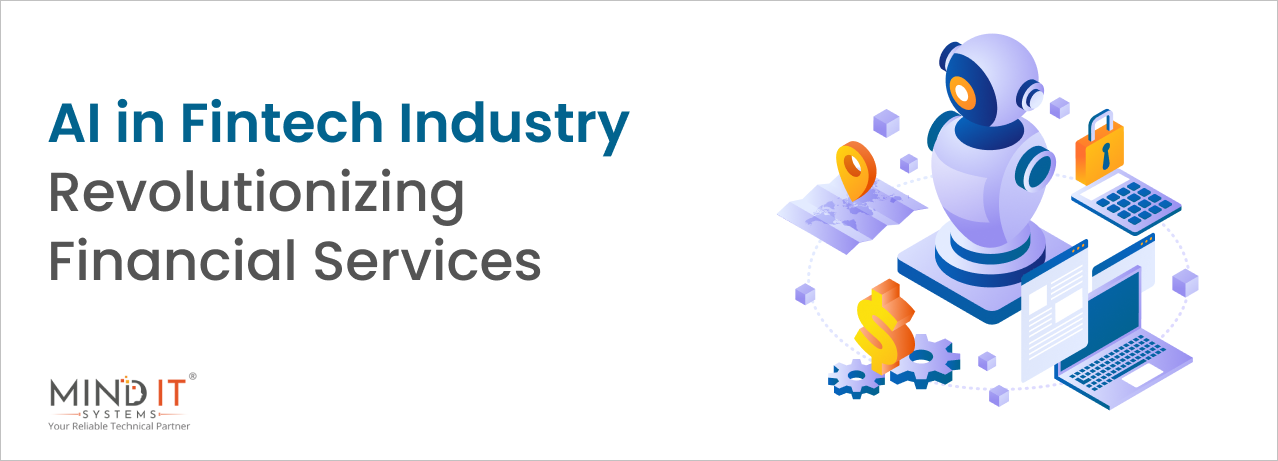
AI in Fintech Industry: Revolutionizing Financial Services
Introduction
The Fintech industry is experiencing rapid development, and a major driving force behind its transformation is Artificial Intelligence (AI). By leveraging AI in Fintech, businesses can modernize operations, improve customer experiences, minimize risks, and make data-driven decisions faster than ever before. With the incorporation of Fintech Artificial Intelligence, the financial services sector has introduced innovative solutions that are reshaping how we manage, invest, and secure our finances.
This article will explore how Artificial Intelligence in Fintech is revolutionizing the financial services industry and its applications, benefits, challenges, and future potential. So, let’s look into how this powerful technology is reshaping the modern financial landscape.
Here we go.
How AI is Transforming the Fintech Industry
Artificial Intelligence in Fintech has brought a paradigm shift to how businesses operate and offer services. AI is at the forefront of innovation, from customer service and fraud detection to risk management and personalized financial advice. As AI continues to evolve, it is enhancing the efficiency of traditional financial tasks and opening up new possibilities for growth and innovation within the industry.
Some key transformations include:
- Automation of Processes: Traditional financial tasks that require manual effort, such as loan processing and credit scoring, are now automated with AI-powered algorithms. This not only saves time but also improves accuracy and efficiency.
- Enhanced Customer Experience: AI-driven chatbots and virtual assistants are improving customer service by offering 24/7 support, personalized interactions, and instant responses. AI is enabling Fintech firms to anticipate customer needs and provide tailored services, making finance more accessible and user-friendly.
- Data Analysis and Insights: With AI, Fintech companies can analyze large volumes of data in real-time. Machine learning algorithms process and interpret vast datasets, offering actionable insights that drive business decisions and enhance overall performance.
To see how AI is revolutionizing other sectors, check out our blog post on AI’s Impact on the Gaming Industry.
Applications of AI in Fintech
AI is transforming the Fintech industry by enhancing efficiency, accuracy, and customer experience. From automating tasks to providing real-time insights, AI is revolutionizing how financial services are delivered. It’s applied across various sectors, addressing fundamental challenges and creating new opportunities.
Here are some of the most notable applications of AI in Fintech:
a) Fraud Detection and Prevention
Fraud is a growing concern in the financial sector. Fintech Artificial Intelligence systems analyze transaction patterns and detect anomalies that may indicate fraud. AI systems can flag suspicious activities in real time, enabling quicker responses to fraudulent attempts. Machine learning algorithms continuously learn from past data to improve accuracy, reduce false positives, and protect customers.
b) Credit Scoring and Loan Underwriting
Traditionally, credit scoring and loan approvals were based on limited financial history and manual processes. AI-driven platforms can now analyze various factors, such as behaviuoral patterns, social media activity, and transaction histories, to assess creditworthiness. By utilizing AI in Fintech, lenders can make more accurate, data-driven decisions about loan approvals and mitigate risks associated with lending.
c) Robo-advisors and Investment Management
AI-powered robo-advisors are disrupting the wealth management industry. These digital platforms use AI in Fintech to provide automated, algorithm-driven financial planning services with little to no human supervision. Robo-advisors assess a client’s financial goals, risk tolerance, and market conditions to create and manage personalized investment portfolios, often at a fraction of the cost of traditional advisors.
d) Customer Support through AI Chatbots
Customer service is crucial to financial services, and AI chatbots have become essential in delivering consistent and efficient support. These bots use Fintech Artificial Intelligence to handle routine inquiries, assist with account management, and guide users through complex financial tasks. By utilizing natural language processing (NLP), these chatbots can understand customer queries and provide accurate responses, thereby reducing wait times and enhancing the customer experience.
e) Algorithmic Trading
In the investment sector, algorithmic trading is one of the most notable applications of AI in Fintech. AI-driven algorithms analyze market trends, economic data, and trading signals to make real-time investment decisions. It allows traders to capitalize on opportunities and manage risks more effectively, all while executing trades faster than humans ever could.
Benefits of Artificial Intelligence in Fintech
AI in Fintech is transforming the industry by offering substantial benefits such as improved efficiency, cost savings, and personalized services. This technology enables Fintech companies to automate tasks, optimize operations, and better manage risks, giving them a competitive edge in the market.
Get to know the top benefits of using Artificial Intelligence (AI) in Fintech:
a) Improved Efficiency
AI automates repetitive tasks, allowing employees to focus on more strategic activities. This enhances productivity and reduces operational costs.
b) Cost Reduction
AI solutions can help Fintech companies reduce costs associated with labour, errors, and manual processes. Automating workflows allows businesses to deliver services faster and more accurately with no human intervention.
c) Personalized Customer Experience
With AI in Fintech, businesses can analyze customer data to deliver personalized services. From tailored investment recommendations to custom loan offers, AI helps companies to provide more relevant and targeted products that improve customer satisfaction and loyalty.
d) Better Risk Management
AI’s real-time ability to analyze large datasets enables Fintech companies to identify potential risks more effectively. Whether through fraud detection, market prediction, or loan risk analysis, AI provides valuable insights that help businesses make informed decisions. Apart from its benefits in the fintech industry, artificial intelligence has many challenges—to discover them, continue reading.
While AI offers transformative benefits to the fintech industry—enhancing efficiency, personalization, and security—it also presents unique challenges. Navigating these challenges is crucial for fully leveraging AI’s potential without compromising compliance, ethics, or data integrity.
Challenges of AI in Fintech
Although the integration of AI in Fintech offers significant benefits, there are challenges that companies must address.
What are these challenges?
Check it out-
a) Data Privacy and Security Concerns
Handling sensitive financial data comes with the responsibility to protect it. AI systems rely on vast amounts of data, which can raise concerns about data privacy and the potential for breaches. Regulatory frameworks like GDPR and other data protection laws require Fintech companies to implement robust security measures to safeguard customer information.
b) Bias in AI Algorithms
AI algorithms can sometimes exhibit biases, especially if the training data is not representative or diverse. This can lead to discriminatory lending or investment practices in the Fintech sector. To avoid this, companies must ensure that their AI models are unbiased and fair.
c) Complexity of Integration
Implementing AI in existing systems can be complex, particularly for traditional financial institutions with legacy infrastructure. Seamlessly integrating AI solutions into outdated systems may require significant investment in technology and talent.
To successfully address the challenges and reap the benefits of AI in fintech, a well-structured digital strategy is essential. Find out how embracing a Digital-First Approach can set you apart from the competition in our blog post, Digital First Approach—The Path to Competitive Edge.
The Future of Artificial Intelligence in Fintech
The future of AI in Fintech is incredibly promising. We can expect even more sophisticated and innovative applications across the financial services sector as AI technologies evolve.
Here are some trends to watch:
a) AI-Driven Financial Inclusion
AI has the potential to democratize financial services, making them accessible to underserved populations. More individuals will have access to credit, savings, and financial management tools through AI-powered mobile banking and micro-lending platforms.
b) Blockchain and AI Integration
The combination of AI and blockchain technologies is set to revolutionize the security and transparency of financial transactions. AI can enhance blockchain’s capabilities by analyzing transaction patterns and identifying suspicious activities in real-time.
c) Quantum Computing and AI
Quantum computing will eventually transform AI’s data-processing capabilities, enabling Fintech companies to perform complex calculations and analyses at unprecedented speeds. This will further improve decision-making in trading, risk assessment, and fraud detection.
d) AI-Powered Financial Forecasting
With advanced machine learning models, Fintech companies can more accurately predict market trends, customer behaviours, and economic shifts. This will help businesses optimize their strategies and stay ahead in a competitive market.
To gain a comprehensive understanding of the trends affecting fintech in 2024, read this blog -the Top 10 Fintech trends for 2024 that are making waves in the industry.
Conclusion
AI in Fintech is reshaping the financial industry by driving innovation, improving efficiencies, and offering more personalized customer experiences. From fraud prevention to robo-advisors and algorithmic trading, the applications of Fintech Artificial Intelligence are vast and transformative. As AI continues to evolve, its potential to revolutionize financial services is only growing. For Fintech companies, embracing AI is no longer an option—it’s essential for staying competitive and relevant in today’s digital age.
Share this post
About the Author

Sujoy Roy
(Head – Digital Marketing)
From my teenage time, I had a quench to solve problems and loved leadership. Starting my career in relation management, ignited my passion for managing people. While managing I realized technology needs to be incorporated to keep pace with the changing world & do my work efficiently.

